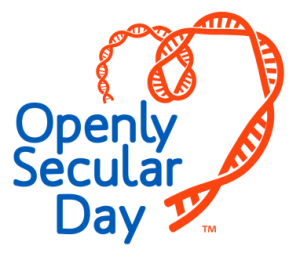Openly Secular and Proud of It

Growing up in Texas, I didn’t know many atheists. In fact, nearly all of my friends were Southern Baptists and committed ones at that. While I only had to deal with a few good-natured (though offensive) questions about my lack of faith and several attempts to bring me into the church, I still felt a bit isolated from my religious friends and family. That is, until I met a fellow atheist in high school and we got to talking about our religious views and the struggle of being a Southerner without faith.
That one chance encounter developed into a great friendship, and it really showed me the importance of belonging to a community of likeminded individuals. It wasn’t as though I was a social pariah because of my lack of religious belief, but I also didn’t have anyone to share in my experience as a nonbeliever and to address some of the negative things in our lives that came about because of our lack of faith.
It’s because of my past experiences that I am a proud supporter of Openly Secular Day, a project of the group Openly Secular. According to their official website, “Openly Secular Day is a celebration of secular people opening up about their secular worldview, and an opportunity for theistic allies to show their support for secular friends and family. This is a day to help others understand our values and how we think. You can participate by attending a local event, making a video, or posting on social media.”
This sort of event is exactly what is needed if atheism, humanism, and other forms of nonbelief are to become part of mainstream society. Advocates for marginalized communities, whether they are discriminated against because of their sexual orientation, gender, or race, recognized long ago that one of the best ways to fight prejudice is to show the prejudiced that the recipients of their hate are just as human as they are. By coming out, gay, lesbian, and transgender Americans have been able to show their friends and families that they aren’t the scary boogeyman portrayed by the religious right, that they’re normal people who are just as deserving of love and respect as the next person. By coming out as secular, our community can begin the same process of normalization and acceptance.
Atheists are one of the most despised groups in the United States, with less than half of Americans saying they felt warmly towards atheists in a 2014 Pew poll. But this anger is due largely to ignorance and a lack of actual knowledge of atheists and what they do and don’t believe. By coming out and dispelling the myths surrounding their religious views and morality, secular and nonreligious Americans are doing what they do best: fighting against ignorance, spreading knowledge, and deconstructing divisive narratives based in religious language that prevent us from working together and loving our fellow human beings.
I encourage everyone, if they can, to tell one family member, friend, or even an acquaintance that they are secular or nonreligious. You may just be surprised to hear that you aren’t the only one.
